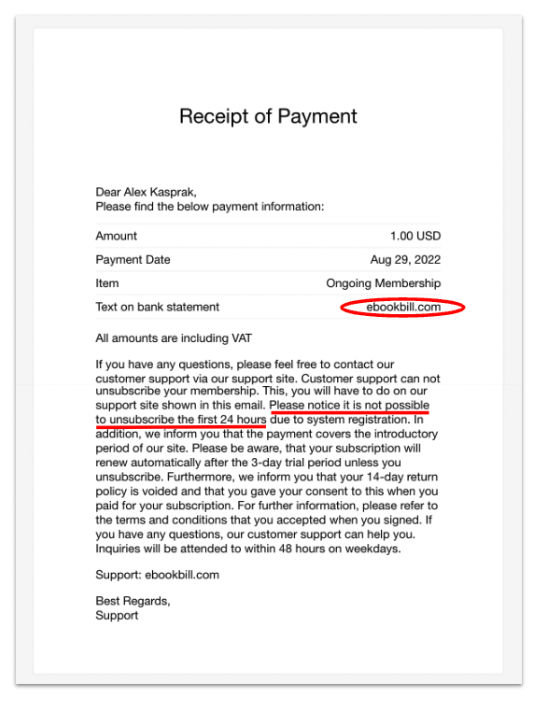Throughout the course of this series, Snopes refers to "effectively fake" or "scam" merchants that offer, at most, a token service. These fake merchants, Snopes argues, are "Potemkin shop windows that serve to create the illusion of legitimate business activity" but are, in reality, part of an affiliate marketing scheme.
The central evidence underpinning this argument is that it appears impossible to sign up for these Piggy Budget- or Book Lounge-style merchants unless the user arrives at the page via an affiliate-marketing link.
Snopes attempted to sign up for an account via the homepages of several apparent Maxpay clients including Book Lounge and Piggy Budget. In these attempts, either our card was declined or an alleged error in the formatting of our phone number prevented us from attempting the payment in the first place.
An Example from Ebookwormers
A site similar to Book Lounge, Ebookwormers, also prevented Snopes from creating an account via its homepage. However, when Snopes arrived at Ebookwormers via an affiliate marketing link preserved by urlscan.io, our attempt to join the website was successful:
https://get.cmpgns.net/60485a23e1a2600001791006?pubid=60338cf179fcbe0001219586&ref_id=d8a4ea0e-495a-4fa0-9575-f91cd35ee354&source=14219
This success occurred even though the information we provided, including the phone number, was identical to the information we provided in our unsuccessful homepage sign-up attempt. The sign-up and process routed Snopes briefly through a maxpay.com URL, further supporting our conclusion that referral data to that website reveal actual clients of Maxpay.
The communications Snopes received as part of this successful attempt to pay for the services of this apparent Maxpay client and e-book library lend further support to the notion that, in the case of the e-book libraries, providing access to e-books is of secondary importance.
For instance, the email receipt one receives after signing up via an affiliate marketing campaign does not actually provide you with the URL of the service you are paying for:
A user would have had to note, beforehand, the name of the merchant (ebookwormers.com) allegedly sponsoring the sweepstakes campaign that compelled them to give up their credit card number. Instead, the user is provided with a generic customer service website (ebookbill.com). Further, the email provides no information on how to actually log in to Ebookwormers, nor does it provide you with a password to do so. It does, however, stress that one needs to wait 24 hours before canceling a 3-day trial.
It's not that it's impossible to log-in to ebookwormers once you have paid for it, but it is a frustrating process complicated by a lack of information at every possible step. To obtain our log in info, Snopes had to request a password reset be sent to the email when we signed up for the website.
It is possible to download material that resembles e-books from this member's area, but that does not absolve Ebookwormers of being an effectively fake merchant. The website does not actually provide downloads to e-books, strictly defined, but instead to a collection of pdf files filled with what appear to be plagiarized and/or generic text:
For example, the "most popular" offering on Ebookwormers is a file titled "Eat Yourself Thin." This matches the title of a dieting book authored by a real human being, but this file — a mere 25 pages of double-spaced word processor text — is not that book. Instead, the "book" contains word-for-word copies of text attributed to a variety of other alleged dieting e-books and also to scammy dieting ads found on Reddit.
Access to a database of possibly-plagiarized pdf files purporting to be e-books may constitute a "service" as defined in the predatory terms of service of a sweepstakes sign-up page, but it is a token service at best, and it is a far cry from what these businesses imply they are offering. Because these merchants appear to offer, at best, token services, we consider them to be "fake" and their services fairly described as imaginary.
This lack of legitimacy is consistent with a conclusion reached by Google's algorithms as well. Many of the apparent Maxpay client URLs including the ones associated with Book Lounge, and Piggy Budget, are now categorized as "Malicious" by Google’s Safe Browsing program. Such urls, according to Google, may "try to trick visitors into sharing personal info or downloading software."
Snopes attempted to join Piggy Budget and several other Maxpay-linked budgeting services, but were prevented from doing so in all cases. As such we have no insight into what service, if any, these merchants provide.


